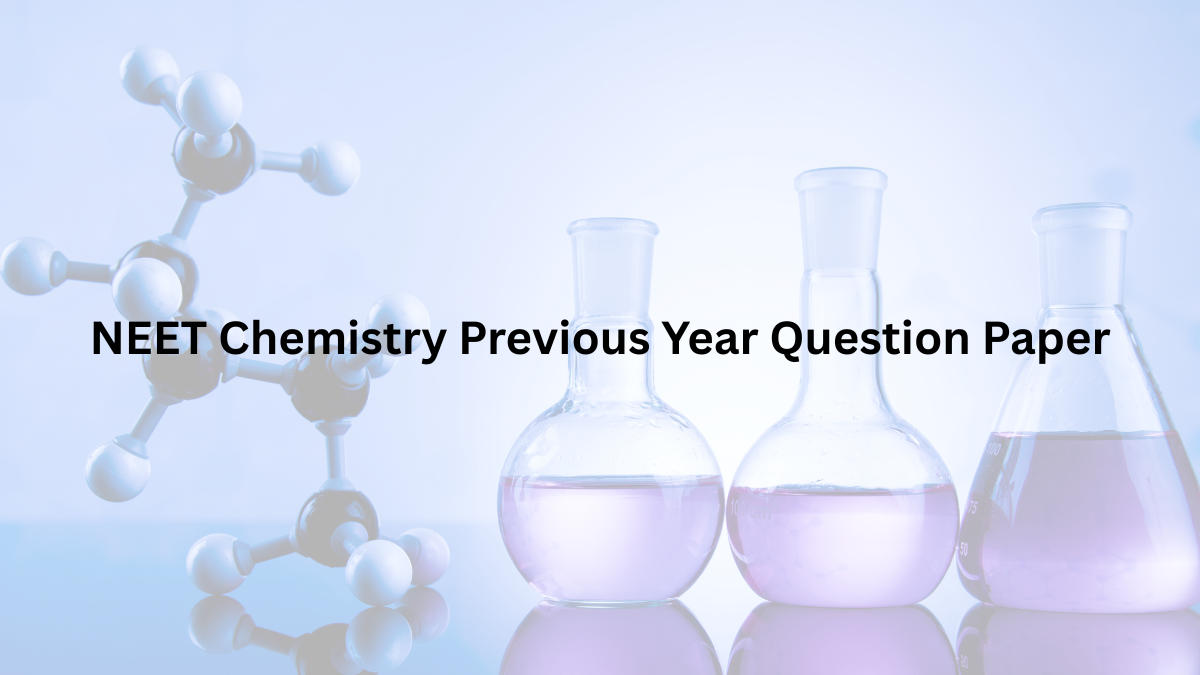Table of Contents
What If I say you can score full marks in NEET UG Chemistry section by solving questions from the previous year papers, Yes you heard it right! The Chemistry section of NEET exam is unarguably the most scoring section and you can ensure maximum marks by solving previous year questions. To provide students with this important resource, we have added NEET Chemistry Previous Year Question Papers in the article below.
NEET Chemistry Previous Year Question Paper
The National Testing Agency releases the official question papers of the National Eligibility cum Entrance Test for Undergraduates (NEET UG). These official question papers are the best source of preparation for the upcoming NEET UG exam as it contains the same level and types of questions. The National Testing Agency (NTA) is going to conduct the highly awaited NEET 2025 exam on May 04, 2025.
To excel in this cut-throat competitive medical entrance exam, candidates need to practice the previous year question papers of NEET UG exam. To score good marks in the NEET UG chemistry section, candidates need to practice the NEET Chemistry previous year question paper.
NEET Chemistry Previous Year Question Papers Highlights
Practicing the NEET Chemistry previous year question papers, candidates will become familiar with the question types and difficulty level. The trends suggest that the chemistry section in NEET exam is the most scoring if candidates have studied the full chemistry syllabus for NEET. It makes more important for students to not miss a chance to score full marks in this section by going through the previous year questions. These questions will also provide hint about the important chemistry topics for the exam.
|
Parameters
|
Details
|
|
Name of Exam
|
National Eligibility cum Entrance Test 2025
|
|
NEET UG Conducting Body
|
National Testing Agency (NTA)
|
|
Type of Questions
|
Multiple Choice Based Questions (MCQ)
|
|
May 04, 2025
|
|
|
Total No. Questions
|
180
|
|
Total Duration
|
180 Minutes (3 hours)
|
|
Maximum Marks
|
720 marks
|
|
No. of Questions in NEET Chemistry Section
|
45
|
|
Maximum marks for NEET Chemistry exam
|
180
|
|
Marks for Each Correct Answer
|
4 marks
|
|
Negative Marking for Wrong Answers
|
-1 marks
|
NEET Chemistry Previous Year Question Papers PDF Download
Candidates can download the NEET UG chemistry previous year question papers PDF from the direct link shared below. The NTA does not issue the chemistry paper separately, rather it releases the combined paper featuring questions from Chemistry, Biology and Physics. However, we have provided the chemistry papers PDF separately wherever we could. Any way, candidates can download the entire question paper of NEET UG exam and head to the chemistry section to solve its questions.
Working on the NEET Chemistry Previous Year Questions can significantly benefit all students by providing them with insight into the exam pattern, time limit, marking system, and other crucial information. Along with the previous year question papers of NEET chemistry, candidates should also attempt the NEET UG mock test 2025.
NEET Chemistry Exam Pattern 2025
As per the latest updates, the NTA has revised the exam pattern for the NEET UG 2025 exam that also affects the chemistry section. Now the NEET UG chemistry section will not have any optional questions. The Part A and Part B of every subject has been scrapped and now there will be only one section per subject. The NEET Chemistry paper will have 45 questions and overall there will 180 questions. Candidates will be given 3 hours to solve the entire question paper and there is no sectional time limit.
Advantages of Solving NEET Chemistry Previous Year Papers
Solving the previous year’s NEET Chemistry question paper benefits students in several ways, such as:
Understand the Exam Format: Working through the NEET Chemistry Previous Year Question Paper will assist students in understanding the exam format since the PYQs adhere to the format utilized in earlier years.
Time Management: A significant advantage of solving NEET Chemistry Previous Year Question Papers is gaining familiarity with time management. By consistently practicing with mock tests, students will learn to adjust to the allotted time for completing the question paper.
Performance Evaluation: Once students complete each NEET Chemistry Past Year Question Paper, they can assess their performance and identify their weaknesses to focus on improvement.
Confidence Development: Successfully solving an increasing number of previous NEET chemistry official question papers will boost students’ self-assurance for the exam day and ultimately aid them in achieving high scores on the test.
NEET Chemistry Previous Year Question Paper with Solutions
Candidates can check the NEET UG Chemistry previous year questions along with their solutions for practice below. Use these questions for honing your skill in Physical, Inorganic and Organic Chemistry.
Q) Gadolinium has a low value of third ionisation enthalpy because of
(1) small size
(2) high exchange enthalpy
(3) high electronegativity
(4) high basic character
Answer (2)
Sol. Electronic configuration of Gadolinium
Gd :— [Xe] 4f7 5d1 6s2
In case of 3rd ionisation enthalpy electron will be removed from 5d and resultant configuration will be [Xe]4f7, that is stable electronic configuration as it will have high exchange energy, hence less energy will be required to remove 3rd electron.
Q) Given below are two statements :
Statement I : The boiling points of aldehydes and ketones are higher than hydrocarbons of comparable molecular masses because of weak molecular association in aldehydes and ketones due to dipole – dipole interactions.
Statement II : The boiling points of aldehydes and ketones are lower than the alcohols of similar molecular masses due to the absence of H-bonding.
In the light of the above statements, choose the most appropriate answer from the given below
(1) Both Statement I and Statement II are correct
(2) Both Statement I and Statement II are incorrect
(3) Statement I is correct but Statement II is incorrect
(4) Statement I is incorrect but Statement II is correct
Answer (1)
Sol. • The boiling points of aldehydes and ketones are higher than hydrocarbons of comparable molecular masses due to weak molecular association in aldehydes and ketones arising out of the dipole – dipole interaction.
• Alcohols involved intermolecular hydrogen bonding, because of which the boiling point of aldehydes and ketones are lower than the alcohols of similar molecular masses.
Q) The incorrect statement regarding chirality is
(1) SN1 reaction yields 1 : 1 mixture of both enantiomers
(2) The product obtained by SN2 reaction of haloalkane having chirality at the reactive site shows inversion of configuration
(3) Enantiomers are superimposable mirror images on each other
(4) A racemic mixture shows zero optical rotation
Answer (3)
Sol. The stereoisomers related to each other as non-superimposable mirror image are called enantiomers.
Q) In one molal solution that contains 0.5 mole of a solute, there is
(1) 500 mL of solvent (2) 500 g of solvent
(3) 100 mL of solvent (4) 1000 g of solvent
Answer (2)
Sol. Molality is the moles of solute dissolved per kg of solvent therefore 500 g, 1 molal solution contains
0.5 of solute, as
m = Moles of solute/Mass of solvent (in kg)
1 = 0.5/Mass of solvent (in kg)
Mass of solvent (in kg) = 0.5
= 500 g
Q) A 10.0 L flask contains 64 g of oxygen at 27ºC. (Assume O2 gas is behaving ideally). The pressure inside the flask in bar is (Given R = 0.0831 L bar K–1 mol–1)
(1) 2.5 (2) 498.6
(3) 49.8 (4) 4.9
Answer (4)
Sol. We know for ideal gas
PV = nRT
P = nRT/V
P = (64/32) x (0.0831 x 300)/10
P = 4.9 bar
Pressure of O2 gas inside the flask = 4.9 bar
You can solve more such questions and check their answers in the PDFs provided in the article above.
Medium of NEET Chemistry Previous Year Questions
Below is the detail about the medium for NEET Chemistry questions:
- Candidates choosing the English language will receive the NEET UG test booklet exclusively in English.
- Candidates choosing Hindi as their language will receive a Bilingual test booklet featuring both Hindi and English.
- Candidates choosing regional languages will receive a Bilingual test booklet in their selected regional language and in English.
- In instances of ambiguity regarding the translation of any questions, the English version of the NEET questions will be considered definitive.
How to Solve NEET Chemistry Previous Year Question Papers
Here are a few key points that every student should remember when tackling previous year’s NEET Chemistry questions:
- Entire NEET Chemistry Curriculum: Initially, you must cover the entire NEET Chemistry Curriculum for the National Eligibility cum Entrance Test to grasp the concepts fully.
- Stay composed and read the full question: Every student should stay calm to prevent stress and anxiety and must read all the questions in NEET Chemistry. Many students feel thrilled upon reading the incomplete question and instinctively try the first response that comes to them.
- Try the paper in order: It is recommended that all students tackle previous year NEET Chemistry questions in order to prevent confusion and to grasp the questions better.
- Avoid postponing questions: It is recommended that students do not put off answering any Chemistry questions until the end since they may forget to address them.
- Use time wisely: When working on NEET Chemistry Previous Year Questions, students must manage their time well. It will alleviate student stress and also assist them in becoming more effective.




 NEET City Intimation Slip 2025 Release D...
NEET City Intimation Slip 2025 Release D...
 NTA NEET Cut Off 2025, Expected Cutoff f...
NTA NEET Cut Off 2025, Expected Cutoff f...
 NEET UG 2025: Is NEET Previous years Que...
NEET UG 2025: Is NEET Previous years Que...


